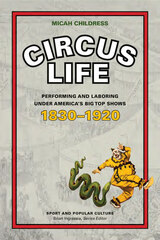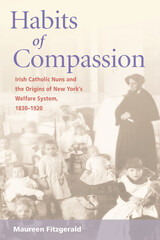
The circus has long been a subject of fascination for many, as evidenced by the millions of Americans that have attended circus performances over many decades since 1870, when the circus established itself as a truly unique entertainment enterprise. Yet the few analyses of the circus that do exist have only examined the circus as its own closed microcosm—the “circus family.” Circus Life, on the other hand, places circus employees in the larger context of the history of US workers and corporate America. Focusing on the circus as a business-entertainment venture, Childress pushes the scholarship on circuses to new depths, examining the performers, managers, and laborers’ lives and how the circus evolved as it grew in popularity over time. Beginning with circuses in the antebellum era, Childress examines changes in circuses as gender balances shifted, industrialization influenced the nature of shows, and customers and crowds became increasingly more middle-class.
As a study in sport and social history, Childress’s account demonstrates how the itinerant nature of the circus drew specific types of workers and performers, and how the circus was internally in constant upheaval due to the changing profile of its patrons and a changing economy.
MICAH D. CHILDRESS received his PhD in history from Purdue University and currently works as a Realtor® in Grand Rapids, Michigan. His articles have appeared in Popular Entertainment Studies and American Studies.

The Irish-Catholic Sisters accomplished tremendously successful work in founding charitable organizations in New York City from the Irish famine through the early twentieth century. Maureen Fitzgerald argues that their championing of the rights of the poor—especially poor women—resulted in an explosion of state-supported services and programs.
Parting from Protestant belief in meager and means-tested aid, Irish Catholic nuns argued for an approach based on compassion for the poor. Fitzgerald positions the nuns' activism as resistance to Protestantism's cultural hegemony. As she shows, Roman Catholic nuns offered strong and unequivocal moral leadership in condemning those who punished the poor for their poverty and unmarried women for sexual transgression. Fitzgerald also delves into the nuns' own communities, from the class-based hierarchies within the convents to the political power they wielded within the city. That power, amplified by an alliance with the local Irish Catholic political machine, allowed the women to expand public charities in the city on an unprecedented scale.
READERS
Browse our collection.
PUBLISHERS
See BiblioVault's publisher services.
STUDENT SERVICES
Files for college accessibility offices.
UChicago Accessibility Resources
home | accessibility | search | about | contact us
BiblioVault ® 2001 - 2024
The University of Chicago Press









